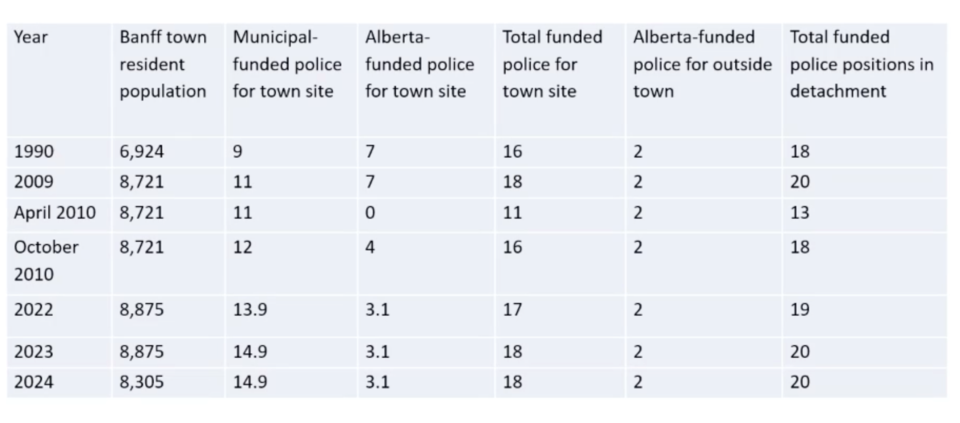BANFF – The Alberta government has come under fire for what the Town of Banff sees as continued provincial downloading of responsibilities onto municipalities following cuts to the 2025 policing grant and RCMP funding to the busy tourist town over time.
The provincial policing grant has been cut $4,560 to $466,440, and although that’s a small amount, Town officials say it shows an ongoing pattern of police funding cuts over the past 15 years that has Town Manager Kelly Gibson calling the latest move an “insult.”
“This is a serious issue because our funding is slowly deteriorating … This is a small amount, but definitely since 2010 a huge amount that did cause a decrease in our policing levels, and continued cuts will cause us to make further tough decisions,” said Gibson during a rare display of frustration at a service review meeting on Monday (Dec. 9).
“My initial request when I found out was that I would ask council to turn down the grant altogether and send it all back, but I don’t think considering our budget situation that would be responsible, and I’ve calmed down since then.”
Mayor Corrie DiManno is firing off a letter on behalf of council to Alberta Public Safety and Emergency Services Minister Mike Ellis to highlight the municipality’s perspective on the cuts to the provincial police contract for Banff.
The mayor earlier pointed out that Banff isn’t like every community in Alberta, noting the tourist town contributed $62 million to provincial taxes and $1.2 billion in provincial GDP in 2019 and attracts more than four million visitors a year.
“We’ve been advocating in earnest for our unique nature here in Banff since 2008 and when reductions like this occur in the budget, it’s a complete slap in the face to that advocacy, and to everything Banff helps to contribute to the province economically and for the country in general, frankly,” she said.
Coun. Grant Canning echoed Gibson’s and the mayor’s frustration.
“This is really horrendous to be honest, especially with a provincial government that’s sitting on a $4.6 billion surplus right now,” he said.
“This is just another example of the province’s continuous downloading of responsibilities onto municipalities which we have seen time and time again.”
The province previously went back on policing commitments outlined in the 1990 Town of Banff incorporation agreement, which is a contractual agreement between the province of Alberta and the federal government granting specific authority and responsibilities to the municipal government.
Under the agreement, the Town of Banff pays for an RCMP detachment, along with support services, facilities and police officers as are deployed in Alberta towns of similar size. The province is to provide and pay for additional policing as required for the ordinary policing of the townsite, while also taking into account Banff’s unique circumstance as a busy tourist town.
At incorporation, the Town of Banff was financially responsible for funding nine police positions, while the Alberta government funded seven. There were two additional rural RCMP officers funded by the province for policing areas outside the townsite. Between 1990 and 2010, and the municipality funded two additional officers to bring the detachment size to 20.
However, Gibson said the then solicitor general’s office informed the Town of Banff in February 2010 that the province would end funding for seven police positions, effective April 1, 2010.
Following extensive consultation, he said the province agreed to fund four positions – still leaving a shortfall of three provincially-funded police officers – forcing the municipality to add two more in 2022 and 2023 respectively. The cost to the Town of Banff associated with each additional officer is about $180,000.
Gibson said the province has repeatedly refused the request for seven provincially-funded officers based on crime statistics from 2020 and 2021, which he noted were years at the height of the COVID-19 pandemic when visitation dramatically dropped and the population plummeted.
He said the province indicated the most recent grant amount was adjusted for population following 2021 federal census results using the 2023 Ministry of Municipal Affairs published population list, which has Banff’s population at just over 8,000. The Town is disputing the population numbers.
“I understand why the province has population for most municipalities. As your population grows you would expect to have more issues with that growing population, but there is no way of factoring in what happens to your police requirements when you have a ballooning visitor population,” Gibson said.
“Surely, the minister responsible for this, Minister Ellis, cannot think only Albertans that live in the town cause crime. There is the possibility that someone visiting can cause crime.”
Coun. Ted Christensen wanted to do more than write a letter, and was keen to discuss sending back the policing grant to send a symbolic message to the province.
“Let’s go to battle, so to speak,” he said.
“It’s very Canadian of us, we’re so mad we wrote a letter, my gosh. We’re in a dire position.”
According to statistics provided by Banff RCMP, the crime severity index for Banff decreased from 118.4 in 2022 to 65.2 in 2023, which is a continuing downward trend since 2017. The only exception to this trend was in 2022 when there were two homicides. Top contributors to Banff’s 2023 crime severity index were in the categories of assault, sexual assault, break and enter, fraud, mischief, and drug trafficking.
Year-to-date crime statistics in Banff up until Oct. 31 show an 11 per cent increase in violent crime, mainly driven by an increase in uttering threats, but police say violent crime remains below pre-pandemic levels.
The Outlook requested an interview with Alberta Public Safety and Emergency Services, but a spokesperson was not immediately available.
“When funding cuts like these happen, I can’t help but think they understand our position but they simply don’t care,” Gibson said.



